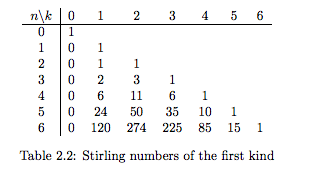As the title suggests, I would like to compute probability vectors with elements proportional to (unsigned) Stirling numbers of the first kind by row. For easy reference, here is the Wiki page.

For example, I'd like an efficient algorithm to return $p_6 \approx \frac{[120, \;274, \;225, \;85, \;15, \;1]}{720}$ when $n=6$. Previous MO questions have considered computing Sterling numbers, for example here and here. In my case, however, a reasonable approximation would suffice. I suppose that the scaling by row-sums might actually make the problem easier, as many of the elements decay rapidly with the row number $n$. It is not immediately obvious how to find such an approximation however, so I'm hoping someone here has a reference or some insight to share.
The approach of this paper might prove useful, but I have not digested it as yet.
This came up for me in a the course of a project concerning de Finetti theorems and kernel density estimation procedures, and is well outside my wheelhouse. I would be happy to hear that this question is trivial for combinatorics specialists. I have also tried the usual Google tactics, but precisely because there is a wealth of information about Stirling numbers I have found my question hard to address.
